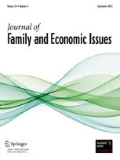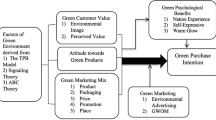Abstract
This study developed a composite measure of green consumption behaviors, incorporating multiple dimensions of green consumption behaviors. As a result of an extensive literature review, four value orientations were proposed: health-related egoistic value orientation, resource-related egoistic value orientation, altruistic value orientation, and biospheric value orientation. And a composite measure of green consumption which measured green consumption behavior manifesting the suggested value orientations were proposed and empirically tested using a Korean sample. After empirical testing and validating the proposed composite measure according to the measurement validation procedure proposed by Nunnally (New York: McGraw-Hill Book Company, 1978), the composite measure of green consumption behaviors was revised to three dimensions of green consumption behaviors: health-conscious green consumption behavior, resource-conscious green consumption behavior, and socially conscious green consumption behavior that combined originally suggested altruistic and biospheric value orientations. A multivariate regression analysis was employed to test the usability of the composite measure of green consumption behaviors and to identify the determinants of green consumption behaviors. As hypothesized, the results of regression analysis showed that perceived consumer effectiveness, reference persons, and perceived market situation are significant determinants of green consumption behaviors, and the effects of environmental concern and socioeconomics are limited. Based on these findings, public policy and marketing implications that promote green consumption are also proposed.


Similar content being viewed by others

References
Adams, W. M. (2006). The future of sustainability: Re-thinking environment and development in the twenty-first century. Report of the IUCN Renowned Thinkers Meeting. Retrieved January 14, 2011 from http://www.cmsdata.iucn.org/downloads/iuch_future_of_sustanability.pdf.
Alwitt, L. F., & Pitts, R. E. (1996). Predicting purchase intention for an environmentally sensitive product. Journal of Consumer Psychology, 5(1), 49–64. doi:10.1016/S1057-7408(96)70404-7.
Antil, J. H. (1984). Socially responsible consumers: Profiles and implications for public policy. Journal of Macromarketing, 5(2), 18–39.
Axelrod, L., & Lehman, D. (1993). Responding to environmental concerns: What factors guide individual action? Journal of Environmental Psychology, 13(2), 149–159. doi:10.1016/S0272-4944(05)80147-1.
Bae, S., & Chun, H. J. (2010). Development of the green family’s model. Seoul: Korean Consumer Agency.
Balderjahn, I. (1988). Personality variables and environmental attitudes as predictors of ecologically responsible consumption patterns. Journal of Business Research, 17, 51–56. doi:10.1016/0148-2963(88)90022-7.
Berger, I., & Corbin, R. (1992). Perceived consumer effectiveness and faith in others as moderators of environmentally responsible behaviors. Journal of Public Policy and Marketing, 11(2), 79–89.
Chan, K. (1999). Market segmentation of green consumers in Hong Kong. Journal of International Consumer Marketing, 12(2), 7–24.
Chen, M. F., & Tung, P. J. (2010). The moderating effect of perceived Lack of facilities on consumers’ recycling intentions. Environment and Behavior, 42(6), 824–844. doi:10.1177/0013916509352833.
Connolly, J., & Prothero, A. (2008). Green consumption: Life-politics, risk and contradictions. Journal of Consumer Culture, 8, 117–146. doi:10.1177/1469540507086422.
Deacon, R. E., & Firebaugh, F. M. (1988). Family resource management. Boston: Ally & Bacon, Inc.
Department for Environment, Food, and Rural Affairs. (2008). A framework for pro-environmental behaviours-annexes. Retrieved July 20, 2010 from http://archive.defra.gov.uk/evidence/social/behaviour/.
Ellen, P., Wiener, J., & Cobb-Walgren, C. (1991). The role of perceived consumer effectiveness in motivating environmentally conscious behaviours. Journal of Public Policy Marketing, 10(2), 102–117.
European Environment Agency. (2007). Sustainable consumption and production in South East Europe and Eastern Europe, Caucasus and Central Asia, (EEA Report 2007/3). Retrieved January 14, 2011 from http://www.eea.europa.eu/publications/eea_report_2007_3.
Finisterra do Paco, A. M., & Rapposo, M. L. B. (2008). Determining the characteristics to profile the “green” consumer: An exploratory approach. International Review on Public Nonprofit Marketing, 5(2), 129–140. doi:10.1007/s12208-008-0010-9.
Fishbein, M., & Ajzen, I. (1975). Belief, attitude, intention, and behavior: An introduction to theory and research. Reading, MA: Addison-Wesley.
Fraj, E., & Martinez, E. (2006). Environmental values and lifestyles as determining factors of ecological consumer behaviour: An empirical analysis. Journal of Consumer Marketing, 23(3), 133–144. doi:10.1108/07363760610663295.
Fraj-Andres, E., & Martinez-Salinas, E. (2007). Impact of environmental knowledge on ecological consumer behavior: An empirical analysis. Journal of International Consumer Marketing, 19(3), 73–102. doi:10.1300/J046v19n03_05.
Gilg, A., Barr, S., & Ford, N. (2005). Green consumption or sustainable lifestyles? Identifying the sustainable consumer. Futures, 37(6), 481–504. doi:10.1016/j.jclepro.2007.08.012.
Gim, T. (2003). A study of influences on green purchasing with structural equation modeling (SEM). Master’s thesis. Retrieved December 03, 2010 from http://library.snu.ac.kr.
Gupta, S., & Ogden, D. T. (2009). To buy or not to buy? A social dilemma perspective on green buying. Journal of Consumer Marketing, 26(6), 376–391. doi:10.1108/07363760910988201.
Hilton, J. M., Martin, S. K., & Haldeman, V. A. (1994). Using psychometric analysis to evaluate the construct validity and reliability of the coping response indices. Journal of Family Economic Issues, 15(3), 201–221.
Jain, S. K., & Kaur, G. (2006). Role of socio-demographics in segmenting and profiling green consumers: An exploratory study of consumers in Korea. Journal of International Consumer Marketing, 18(3), 107–146. doi:10.1300/J046v18n03_06.
Laroche, M., Bergeron, J., & Barbaro-Forleo, G. (2001). Targeting consumers who are willing to pay more for environmentally friendly products. Journal of Consumer Marketing, 18(6), 503–520.
Lucey, T. (2005). Assessing the reliability and validity of the jump start survey of financial literacy. Journal of Family and Economic Issues, 26(2), 283–294. doi:10.1007/s10834-005-3526-8.
Mainieri, T., Barnett, E. G., Valdero, T. R., Unipan, J. B., & Oskamp, S. (1997). Green buying: The influence of environmental concern on consumer behavior. Journal of Social Psychology, 137(2), 189–204.
McDonald, S., Oates, C., Thyne, M., Alevizou, P., & MacMorland, L. (2009). Comparing sustainable consumption patterns across product sectors. International Journal of Consumer Studies, 33(2), 137–145. doi:10.1111/j.1470-6431.2009.00755.x.
McEachern, M., & McClean, P. (2002). Organic purchasing motivations and attitudes: Are they ethical? International Journal of Consumer Studies, 26(2), 85–92. doi:10.1046/j.1470-6431.2002.00199.x.
Mostafa, M. M. (2007). Gender differences in Egyptian consumers’ green purchase behavior: The effects of environmental knowledge, concern and attitude. International Journal of Consumer Studies, 31(3), 220–229. doi:10.1111/j.1470-6431.2006.00523.x.
Nunnally, J. C. (1978). Psychometric theory (2nd ed.). New York: McGraw-Hill Book Company.
Ottman, J. A. (1993). Green marketing: Challenges & opportunities. Lincolnwood, IL: NTC Business Books.
Ozcaglar-Toulouse, N., Shlu, E., & Shaw, D. (2006). In search of fair trade: Ethical consumer decision making in France. International Journal of Consumer Studies, 30(5), 502–514. doi:10.1111/j.1470-6431.2006.00532.x.
Peattie, K. (2001). Golden goose or wild goose? The hunt for the green consumer. Business Strategy & The Environment, 10(4), 187–199. doi:10.1002/bse.292.
Pelsmacker, P., Driesen, L., & Rayp, G. (2005). Do consumers care about ethics? Willingness to pay for fair-trade coffee. Journal of Consumer Affairs, 39(2), 363–385. doi:10.1111/j.1745-6606.2005.00019.x.
Prothero, A. (2008). Green consumption: Life-politics, risk and contradictions. Journal of Consumer Culture, 8(1), 117–145. doi:10.1177/1469540507086422.
Roberts, J. A. (1996). Green consumers in the 1990s: Profile and implications for advertising. Journal of Business Research, 36(3), 27–232.
Schaefer, A., & Crane, A. (2005). Addressing sustainability and consumption. Journal of Marcromarketing, 25(1), 76–92. doi:10.1177/0276146705274987.
Schwartz, S. H. (1992). Universals in the content and structure of values: Theoretical advances and empirical tests in 20 countries. In M. Zanna (Ed.), Advances in experimental social psychology (pp. 1–65). Orlando, FL: Academic Press.
Shrum, L. J., Lowrey, T. M., & McCarty, J. A. (1994). Recycling as a marketing problem: A framework for strategy development. Psychology & Marketing, 11(4), 395–416. doi:10.1002/mar.4220110407.
Smith, S., Haugtvedt, C., & Petty, R. (1994). Attitudes and recycling: Does the measurement of affect enhance behavioral prediction? Psychology and Marketing, 11(4), 359–374. doi:10.1002/mar.4220110405.
Sohn, S. H., Kim, K., Rha, J. Y., & Choi, S. (2010). Green consumption competency: A conceptual model of its framework and components. Consumer Policy and Education Review, 8(3), 95–119.
Stem, P. C., & Oskamp, S. (1987). Managing scarce environmental resources. In D. Stokols & I. Altman (Eds.), Handbook of environmental psychology (pp. 1043–1088). New York: Wiley.
Stern, P. C. (1999). Information, incentives & proenvironmental consumer behavior. Journal of Consumer Policy, 22(4), 461–478.
Stern, P. C., & Dietz, T. (1994). The value basis of environmental concern. Journal of Social Issues, 50(3), 65–84. doi:10.1111/j.1540-4560.1994.tb02420.x.
Straughan, R. D., & Roberts, J. A. (1999). Environmental segmentation alternatives: A look at green consumer behavior in the new millennium. Journal of Consumer Marketing, 16(6), 558–575.
Tanner, C., & Kast, S. W. (2003). Promoting sustainable consumption: Determinants of green purchases by Swiss consumers. Psychology and Marketing, 20(10), 883–902. doi:10.1002/mar.10101.
Thogersen, J. (2000). Psychological determinants of paying attention to eco-labels in purchase decisions: Model development and multinational validation. Journal of Consumer Policy, 23(3), 285–313.
Thogersen, J. (2005). How many consumer policy empower consumers for sustainable lifestyles? Journal of Consumer Policy, 28(2), 143–177. doi:10.1007/s10603-005-2982-8.
Thogersen, J. (2010). Country differences in sustainable consumption: The case of organic food. Journal of Macromarketing, 30(2), 171–185. doi:10.1177/0276146710361926.
Van Birgelen, M., Semeijn, J., & Keicher, M. (2009). Packaging and proenvironmental consumption behavior: Investigating purchase and disposal decisions for beverages. Environment and Behavior, 41(1), 125–146. doi:10.1177/0013916507311140.
Vining, J., & Ebreo, A. (1990). What makes a recycler? A comparison of recyclers and nonrecyclers. Environmental Behavior, 22, 55–73.
Webster, F. (1975). Determining the characteristics of socially conscious consumer. Journal of Consumer Research, 2(12), 188–196.
Welsch, H., & Kuhling, J. (2009). Determinants of pro-environmental consumption: The role of reference groups and routine behavior. Ecological Economics, 69, 166–176. doi:10.1016/j.ecolecon.2009.08.009.
Young, W., Hwang, K., McDonald, S., & Oates, C. J. (2010). Sustainable consumption: Green consumer behavior when purchasing products. Sustainable Development, 18, 20–31. doi:10.1002/sd.394.
Zepeda, L., & Deal, D. (2009). Organic and local food consumer behaviour: Alphabet theory. International Journal of Consumer Studies, 33, 697–705. doi:10.1111/j.1470-6431.2009.00814.x.
Author information
Authors and Affiliations
Corresponding author
Appendix
Appendix
Rights and permissions
About this article
Cite this article
Kim, SY., Yeo, J., Sohn, S.H. et al. Toward a Composite Measure of Green Consumption: An Exploratory Study Using a Korean Sample. J Fam Econ Iss 33, 199–214 (2012). https://doi.org/10.1007/s10834-012-9318-z
Published:
Issue Date:
DOI: https://doi.org/10.1007/s10834-012-9318-z



